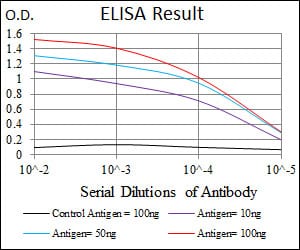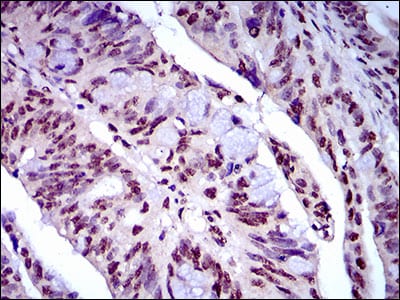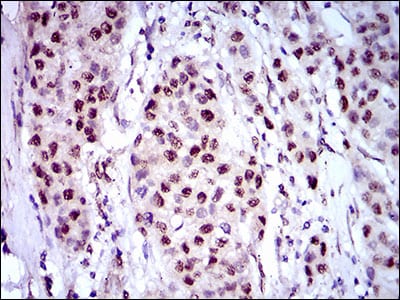



| WB | 1/500 - 1/2000 | Human,Mouse,Rat |
| IF | 咨询技术 | Human,Mouse,Rat |
| IHC | 1/200 - 1/1000 | Human,Mouse,Rat |
| ICC | 技术咨询 | Human,Mouse,Rat |
| FCM | 咨询技术 | Human,Mouse,Rat |
| Elisa | 1/10000 | Human,Mouse,Rat |
| Aliases | KAP; Kdap; NAP1; NAPA; SNAPA |
| Entrez GeneID | 9476 |
| clone | 10C4B8 |
| WB Predicted band size | 45.4kDa |
| Host/Isotype | Mouse IgG1 |
| Antibody Type | Primary antibody |
| Storage | Store at 4°C short term. Aliquot and store at -20°C long term. Avoid freeze/thaw cycles. |
| Species Reactivity | Human,Rat |
| Immunogen | Purified recombinant fragment of human NAPSA (AA: 20-158) expressed in E. Coli. |
| Formulation | Purified antibody in PBS with 0.05% sodium azide |
+ +
以下是关于NAPSA(Napsin A)抗体的3篇文献示例及简要摘要:
---
1. **文献名称**:*Napsin A and TTF-1 expression in pulmonary adenocarcinomas*
**作者**:Mukhopadhyay S, Katzenstein AL.
**摘要**:研究分析了Napsin A和TTF-1在肺腺癌中的表达模式,证实Napsin A可作为肺腺癌的特异性标志物,尤其在TTF-1阴性病例中具有互补诊断价值。
---
2. **文献名称**:*Napsin A expression in renal cell carcinomas: a potential diagnostic pitfall*
**作者**:Lin F, Shi J.
**摘要**:探讨Napsin A在肾细胞癌中的异常表达,提示其在诊断中可能导致误判,强调需结合其他标志物(如PAX8)进行鉴别诊断。
---
3. **文献名称**:*Utility of Napsin A in diagnostic pathology: a review*
**作者**:Bishop JA, Sharma R, Illei PB.
**摘要**:综述Napsin A抗体的应用,强调其在肺腺癌与鳞癌鉴别、转移性腺癌来源判断中的关键作用,并讨论其局限性及与其他标志物的联合使用。
---
**备注**:以上文献为示例,实际引用时需核实具体来源及内容准确性。如需具体文献链接或补充,可进一步提供研究方向。
NAPSA (Napsin A aspartic peptidase) is a protease enzyme primarily expressed in the lungs and kidneys, where it plays a role in proteolytic processing of proteins. In the lungs, NAPSA is involved in the maturation of surfactant protein B (SP-B), critical for respiratory function. Its expression is largely restricted to type II pneumocytes and alveolar macrophages, making it a tissue-specific marker.
NAPSA antibodies are widely used in immunohistochemistry (IHC) to identify lung adenocarcinomas, as NAPSA is highly expressed in these tumors. It serves as a diagnostic marker to differentiate primary lung adenocarcinomas from metastatic carcinomas, especially when combined with other markers like TTF-1. NAPSA positivity in renal cell carcinomas has also been reported, highlighting its broader utility in tumor subtyping.
Research into NAPSA antibodies has expanded due to their potential role in targeted therapies and molecular diagnostics. For instance, NAPSA expression may correlate with tumor differentiation and prognosis in certain cancers. However, its biological mechanisms in cancer progression remain under investigation. Antibodies against NAPSA are thus essential tools in both diagnostic pathology and exploratory research, bridging clinical applications with ongoing studies into its functional significance.
×